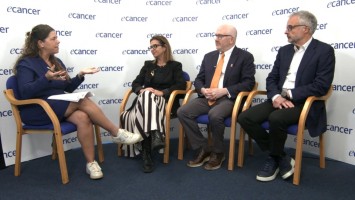The DESKTOP III study was presented at ASCO on Friday and we could present the final results of this randomised phase III study. The question of this study was about the impact of secondary cytoreductive surgery in recurrent ovarian cancer. This is the first phase III study, multinational and multicentric study, evaluating this question and being finished with all patients recruited and mature overall survival data.
The patients selected were those having a relapsed ovarian cancer with a treatment free interval between their primary treatment and relapse of more than six months. In fact, most of the patients had twelve or more months treatment free interval before they entered the study. Then the patients were selected by an AGO score, the DESKTOP score , which is a composite score of clinical factors available before surgery. It includes good performance status, ascites of less than 500ml or none and the primary surgery result of a complete resection at the initial treatment. When all these factors were positive the patient had a positive score and was eligible. Furthermore, the centres participating in the study were selected and only expertise centres with both capacity and competence and skills were selected to run the study.
We did some prior studies, DESKTOP I and DESKTOP II, to evaluate this score so this score had already been evaluated in a multinational, multicentric trial and confirmed that it is able to select patients with a high probability of achieving a complete resection during this surgery. In fact, in the prior studies about three out of four patients had a complete resection if they had a positive score. So we felt that this is an ethical approach that we choose or recruit only patients who have a high probability of having a successful surgery and expose them to the surgical risks of such a study.
Patients were then randomised between surgery or no surgery and all of the patients received the state of the art standard medical treatment consisting of a platinum combination chemotherapy afterwards. We recruited until 2015 and now earlier this year we had the final event number and mature data so that we could run the analysis. The hypothesis of this study was that surgery added to the standard treatment strategy would improve survival in these patients. In fact, this trial was positive so we found an overall survival impact of surgery, prolonging survival after recurrent disease to a clinically meaningful and significant amount.
About 75% of patients selected by AGO score had a complete resection in the end and these patients have on median a 16 months longer survival than patients not being offered the operation. So we can clearly demonstrate with this study that the role of surgery at selected centres for a selected population provides a survival benefit.
Overall about 50% of patients with a recurrent ovarian cancer have a positive AGO score so we suggest that practice has to be changed and the standards have to be rewritten after we’ve published now these results at ASCO. All patients should be evaluated whether they fit into the schedule which we used for this study, it means that they have a positive DESKTOP score. We know that about 50% of patients will have a positive score and in these patients the probability of achieving a complete resection is three out of four patients, so 75%. These patients really benefit from surgery with a prolonged survival and the addition of extra survival times longer as ever have been seen with any chemotherapy. So patients should be counselled about this opportunity and if they are willing to go for a second surgery and if they fulfil the criteria and if they have access to an expert centre which is capable of performing this type of surgery then they should have the right to opt for it or not.
The crucial thing about secondary surgery is the selection of the right centre and selection of the right patient. But if both fit then this offers an opportunity to improve life, quality of life and length, duration, of overall survival in these patients.








